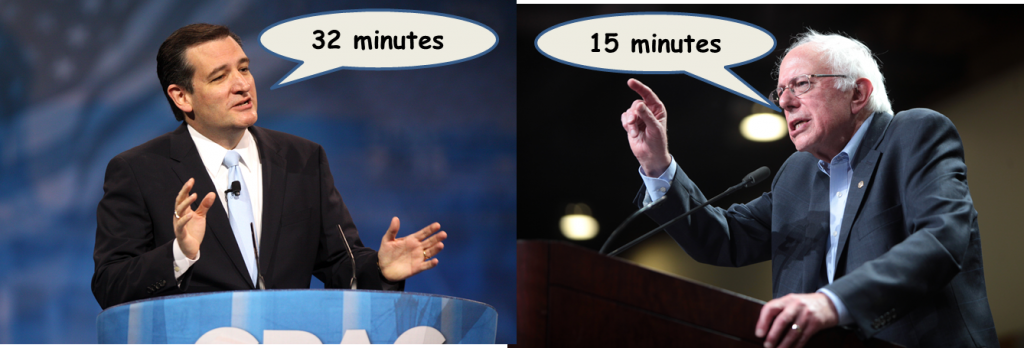Maybe all those PPM Rules we were taught don’t hold as much water as was once thought. Where to break, setting appointments, and how long to talk all started as suggestions that morphed into guidelines that transformed into engraved rules on a granite tablet, handed down from Mt. Arbitron when meters became the ratings currency in radio’s biggest markets.
Over time, few have questioned these rules – or commandments. To do so is considered as blasphemous as questioning where Moses came up with those 10 rock-solid tenets that have guided the way we try to live our lives.
Yet, in Iowa, the commandments have been questioned for months on end. And almost every rule that was part of the conventional wisdom of politics was refuted by the thousands who caucused last Tuesday. Donald Trump certainly got the ball rolling, upending one “truth” after another. From his controversial statements to his refusal to apologize to his mean-spirited tweets to his name-calling at debates, The Donald set a very different tone for this campaign that other candidates have been forced to adopt or at least adjust to.
But perhaps one of the more interesting stats about who voted for whom, and what might have motivated voting behavior, was released by C-SPAN last week. They timed the average speech lengths of the candidates and here are the results:
#IowaCaucus Speech Lengths:
Cruz-32:23
Sanders-15:40
Rubio-11:42
O'Malley-11:28
Clinton-6:28
Trump-2:48
Paul-2:35 pic.twitter.com/z5veLXQX7z— CSPAN (@cspan) February 2, 2016
And isn’t it interesting that the winner (and near-winner) of both the Republican and Democrat races in the Iowa Caucus were the candidates whose speeches ran the longest. The average Ted Cruz stump speech had a duration of more than a half hour, while Bernie Sanders used up well more than a quarter-hour during his campaigning – more than doubling his rival, Hillary Clinton.
Of course, these speech lengths don’t necessarily translate to results, as evidenced by Martin O’Malley and others who talked a lot but somehow didn’t connect with voters. In radio, we’d blame this on a lack of prep, or more than likely too many thoughts per stump speech.
I’m not suggesting this means that radio’s air personalities should be talking more. But perhaps there is something to the notion that if you have something interesting and pertinent to say or you have a powerful, compelling message, it may require more time to get your point across. And in fact, entertaining personalities on sports, news/talk, rock, public radio, and country stations break the rules every time they open the mic – and consistently score well in the Nielsen ratings – diary or meter.
So rather than thinking about this odd political stat as a new paradigm or even a reverse commandment, perhaps it is more of a message that we are living in a time when so many of the old rules are breaking down. And that artfully breaking some of them can actually translate into results.
We sometimes get so caught up in how success was achieved four years ago or forty years ago that we may miss the larger truth that consumer habits and their sensibilities are changing – that some of the hard and fast rules that governed the way political campaigns were run or radio stations were programmed and managed are being questioned by audiences looking for something a little different.
Of course, then there’s the old axiom about repetition of the hits – something that has long been thought to be a formula for driving ratings success. As the theory goes, when the audience says they’re tired of hearing it, that’s when you should be playing it the most. Perhaps Marco Rubio is questioning whether that rule will hold up this week.
Onto New Hampshire…and the spring book.
- Why “Dance With Those Who Brung You” Should Be Radio’s Operating Philosophy In 2025 - April 29, 2025
- The Exponential Value of Nurturing Radio Superfans - April 28, 2025
- What To Do If Your Radio Station Goes Through A Midlife Crisis - April 25, 2025





I’m way far away from the current radio business – but to an outside observer, it seems as though PPM has under-reported a lot of talk stations and personality driven shows – possibly giving false support the the idea that more music morning shows are what really gets ratings.
it will be interesting to look at the overall share of spoken word stations and personality driven morning shows in 2017 vs. say, 2014.
It’s truly hard to say because between the diary days and our metered reality now, we’re talking different methodologies. The question about how Howard Stern would perform in the PPM world is something we will probably never know. And add to that some of the (alleged) encoding issues with spoken word (and the Voltair dilemma), and there are a lot of unknowns. Thanks, Bob.
Great reference to Marco Rubio and yes it will be interesting to see how that plays out also, Voltair encoding…. does it work and how accurate is it?
I think the Marco Rubio/radio connection here is analogous to a station calling an audible due to a special event. Breaking for news, playing a David Bowie/Glen Frey cut after the passed, etc. Rubio seems to be like an call center rep – listening for key words and responding with something prepared, rather than listening to the question and responding to it.